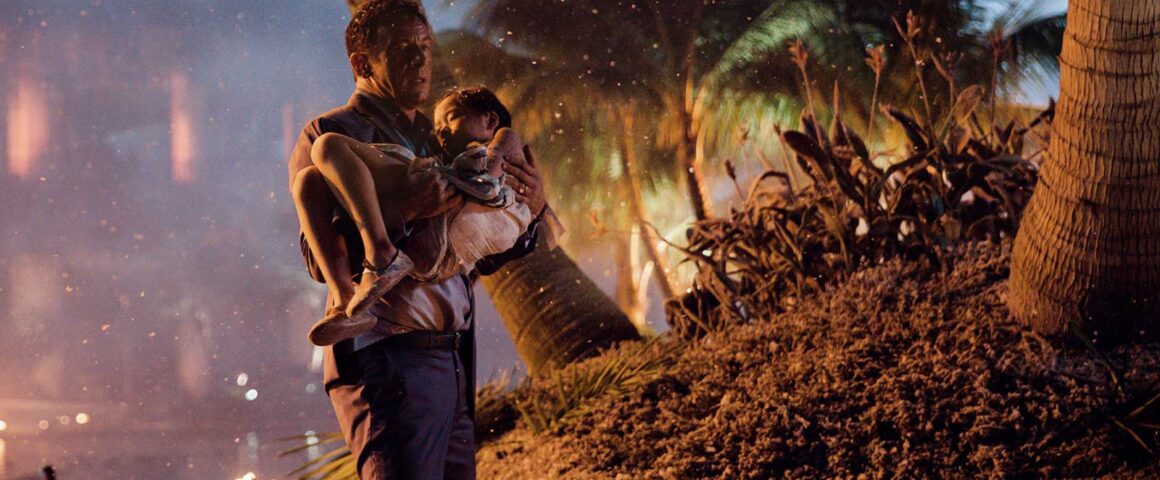Simon West’s Skyfire is equal parts “Jurassic Park,” “Armageddon,” and, well, “Volcano”: A tireless, heart-pounding leap beyond such niceties as logic and character development into the well-trod terrain of super-duper action movie. And by that purple prose, I mean that it’s a damn fine movie to veg out to and just enjoy for what it is. This is not a movie that pretends to be any more than a thrilling adventure, existing solely for our entertainment (if not our scrutiny).
This Chinese production, co-written by Wei Bu and Sidney King and featuring an almost exclusively Asian cast, puts many Hollywood would-be blockbusters to shame. The film is set on one of the islands in the Pacific Ocean’s infamous Ring of Fire — islands that house the world’s most tumultuous volcanoes. In a preamble scene, we see a group of researchers on the fictional Tianhuo Island, studying the (maybe) dormant volcano, when the unthinkable happens and the darn thing actually erupts. And, unlike other eruptions that can unfold over the course of many hours, this one takes about 20-minutes to annihilate anything in its path. There’s a particularly gripping sequence in which a husband-wife team (with young daughter in tow), on opposite sides of their research area, are separated from each other. The husband and the daughter survive; the mother does not.
That daughter, of course, grows up to study volcanoes in an effort to better understand how they’re caused and how to predict them with some certainty. Meng Li (Hannah Quinlivan, “Skyscraper”) has created her own device (sort of like the contraption in 1996’s “Twister”) and brought it to the very same Tianhuo Island where her mother perished. Simultaneously, an English entrepreneur named Jack Harris (Jason Isaacs, “London Fields”) has created a tourist attraction around the volcano, because why not? He’s already built hoteling and some infrastructure around the island, and now he’s trying to get investors for Phase II of his operation — a system that takes customers to the top of the mountain via monorail and then lowers them into the volcano itself via a large platform. Oh, but not too low, because those things are hot.
As with John Hammond’s Jurassic Park, Jack Harris is anxious to open up for business, and like Hammond he does have scientists around doing lots and lots of testing to ensure that the park will be completely safe. But you get the distinct feeling that he’s not going to halt construction or delay his opening even if one of those pesky poindexters expresses doubts about said safety. It’ll be all right, he tells everyone. Everyone includes Meng Li, who’s discovered some “unusual” seismic activity deep within the volcano. My intuition tells me that everything will not be all right, no matter what Mr. Harris thinks.
Meng Li has also been estranged from her father for many years, blaming him for not being there when her mother perished. Or when she graduated high school, or college, or when she was awarded any number of degrees, or anything. You were never around, she tells him mid-film. Naturally, since his only daughter has decided to return to the very island where her own mother died as the result of a volcanic eruption, Professor Wentao Li (Xueqi Wang, “Iron Man 3”) travels to the island himself to confront her — since she’s ignored all of his calls and other communications. Just so you know there’s a healthy father-daughter dynamic going on here.
Well, to the surprise of no one other than Jack Harris and anyone else involved in the attraction, the volcano does indeed erupt, and it’s quite the sight on film. Plumes of fire and rocks jet out from the mountain at impossibly fast speeds. An enormous ash cloud begins to descend the mountain. And, of course, there are two monorail cars full of people right there in the volcano as it starts to make its presence known.
This is where Skyfire really kicks into a different gear. As rock, ash, fire, and lava emerge, the monorail cars travel down the mountain in a race to the bottom. It’s a beautifully shot, visually arresting scene sure to make one pause before boarding a tram car or gondola in the future. The entire sequence is expertly shot — certainly on par with Hollywood’s best action movies, and in some senses even better.
But it’s not just that one sequence that sold me on this film. There’s a stressful underwater sequence as a couple, who have gone to a cavern so the boy can propose to the girl, desperately try to escape the wrath of the mountain by swimming along an underwater pipeline, and another scene in which the same couple walks through a decimated village to find the girl’s grandfather. And an exciting outrun-the-lava-with-a-Jeep scene, to boot!
Most — but not all — of the movie is in Mandarin, subtitled in English. Jack Harris’s lines are all spoken in English, the better to paint him as the insensitive interloper who’s carelessly putting lives at risk. For me, the subtitles were extraordinarily helpful, and considering that the big draw here is the ACTION, they didn’t get in the way of my enjoyment of the movie in the tiniest.
Skyfire is definitely a movie that would play best on a big screen, but since more and more of us have large-screen TVs and since more and more of us are staying home and not going to a theater even where it’s allowed . . . watching this at home is perfectly okay. Just be prepared for a lot of action and for some dialog (even in English) that you might not catch right away. Oh, and don’t get drawn in by the presence of Jason Isaacs in the credits; his arc is mostly a footnote to the story.



